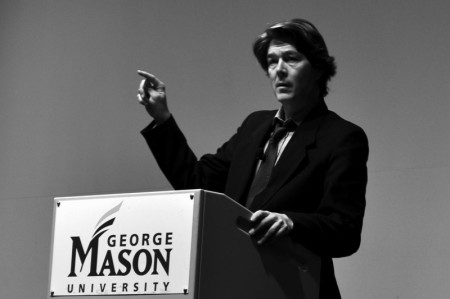
Climate Change expert Mark Hertsgaard’s lecture focused on the implications of climate change worldwide. Photo By Gregory Connolly.
Noted writer and environmentalist Mark Hertsgaard visited George Mason University on Wednesday to present a lecture on the issue of climate control and our future in a warming world. Hertsgaard discussed his new book, “Hot: Living Through the Next Fifty Years on Earth.”
Speaking to students of all ages, Hertsgaard noted that many in the audience were part of “generation hot,” a term coined to describe individuals born after June 23, 1988. That day is significant as the day when NASA scientist James Hansen first alerted the world to the climate crisis. The time since that day, Hertsgaard told the crowd, accounts for 40 percent of total greenhouse gas emissions.
He noted that this generation would have to deal with “the hottest, most volatile climate our civilization has ever known.”
Because there is no way to erase the damage that has been done, Hertsgaard warned the crowd that a certain amount of warming is inevitable. Even if we were able to revolutionize the way we live, including systems of energy, agriculture and transportation, a 30-year lag effect would sustain high temperatures for a total of 50 years before there would be relief.
This creates a situation with a “double imperative” – stopping the rapid warming and living through the damage that cannot be undone. The response must be twofold, consisting of adaptation (at the local level) and mitigation (locally and globally).
“Because of this paradigm shift,” Hertsgaard said, “we all have to start thinking and, above all, acting differently about the climate.”
Hertsgaard’s message was sober but not without hope. He has already seen cutting-edge technology and passionate activists and cited communities in California and Washington state as leading the way in energy reform. One positive element he mentioned was the enormity of coping with climate change would create jobs in all fields to deal with the crisis.
A common theme during the event was the importance of local grassroots activism. One thing Hertsgaard recommended was learning about the local area’s environmental situation and engaging in simple activities like growing food, planting trees or joining a group like the Sierra Club.
A difficulty Hertsgaard noted in his lecture was the slow response to the climate crisis from the political sphere, saying that the only debate about the truth of global warming was “inside the beltway.”
Hertsgaard, who had spent the previous day confronting those who he termed “climate cranks” on Capitol Hill, said the United States needs to catch up to its allies overseas, such as France and Germany, two countries that have accepted the idea of global warming for over a decade.
During the Q&A, Hertsgaard told one activist that the best way to affect change in the government is to vote out of office those who refuse to work on environmental issues out of office.
Hertsgaard closed the lecture with an apology to “generation hot” from the previous generation for not adequately addressing the climate problem and saying that, though it will require a great amount of work, the current generation can still turn things around if they commit and start now.






Comments